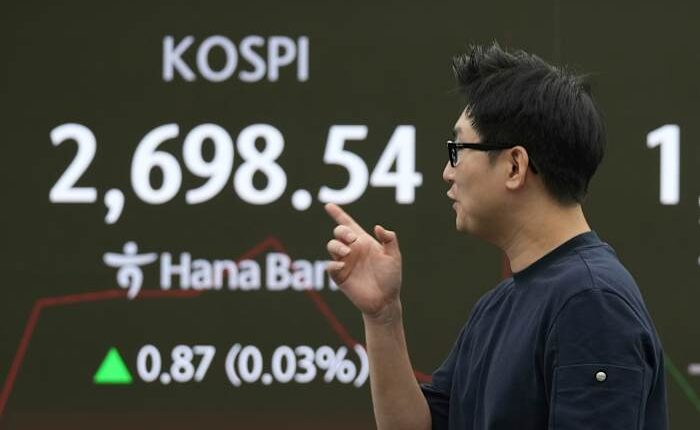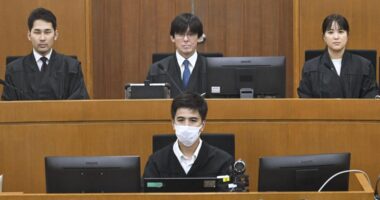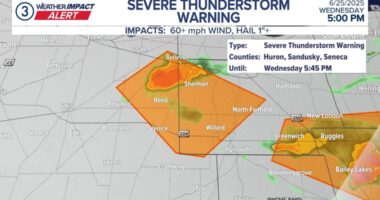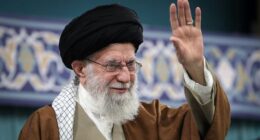
HONG KONG – There was a decline in Asian shares on Monday and oil prices saw an increase due to escalating trade tensions and the conflict between Russia and Ukraine, which added to geopolitical uncertainty.
The Hang Seng index in Hong Kong dropped by over 2% as Beijing and Washington engaged in a war of words regarding trade. President Donald Trump’s declaration of doubling tariffs on steel and aluminum to 50% raised concerns among investors, contributing to the market turmoil.
Furthermore, market sentiment was negatively impacted by a weekend report indicating a contraction in China’s factory activity in May. Although the pace of decline had slowed from April, it deepened concerns as China and the U.S. had agreed to reduce the high tariffs imposed by President Trump.
Markets in mainland China were closed for a holiday.
Oil prices rallied after OPEC+ decided on a modest increase in output beginning in July. It was the third monthly increase in a row.
U.S. benchmark crude oil gained $1.60 to $62.39 per barrel, while Brent crude, the international standard, was up $1.41 at $64.19 per barrel.
Moscow pounded Ukraine with missiles and drones just hours before a new round of direct peace talks in Istanbul and a Ukrainian drone attack destroyed more than 40 Russian planes deep in Russia’s territory, Ukraine’s Security Service said on Sunday.
Hong Kong’s Hang Seng dropped 2.2% to 22,778.45 as China and the U.S. accused each other of breaching their tariff agreement reached in Geneva last month.
Tokyo’s Nikkei 225 lost 1.6% to 37,356.97, while the Kospi in Seoul fell 0.4% to 2,686.17.
Australia’s S&P/ASX 200 retreated 0.2% to 8,416.00.
On Friday, Wall Street closed its best month since 2023. The S&P 500 retreated less than 0.1% to end at 5,911.69 and the Dow industrials Jones Industrial Average edged 0.1% higher to 42,270.07. The Nasdaq composite fell 0.3% to 19,113.77.
Gap weighed on the market even though the retailer reported stronger profit and revenue for the latest quarter than analysts expected.
The company behind Banana Republic and Old Navy fell 20.2% after saying tariffs on imports from China and other countries could add up to $300 million to its costs this fiscal year. It has strategies set to mitigate up to half of that before it hits its profits.
Hopes had largely been rising that the worst of such worries had passed, which in turn sent stocks rallying, after Trump paused his tariffs on both China and the European Union. A U.S. court then on Wednesday blocked many of Trump’s sweeping tariffs. That all sent the S&P 500 in May to its first winning month in four and its best since November.
But the tariffs remain in place while the White House appeals the ruling by the U.S. Court of International Trade, and the ultimate outcome is still uncertain.
Friday’s most influential losses came from several Big Tech stocks. Nvidia fell 2.9% to give back some of its gain from earlier in the week after it topped analysts’ expectations for profit in the latest quarter. It was the single heaviest weight by far on the S&P 500.
On the winning side of Wall Street was Ulta Beauty, which rose 11.8% after the retailer reported stronger sales and profit than analysts forecast. It also raised the top end of its forecasted range for revenue this fiscal year even though CEO Kecia Steelman called the operating environment “fluid.”
Costco climbed 3.1% after the retailer’s results and revenue for the latest quarter edged past analysts’ expectations.
In the bond market, Treasury yields eased after a report showed that the measure of inflation that the Federal Reserve likes to use was slightly lower in April than economists expected.
A separate report from the University of Michigan said that sentiment among U.S. consumers was better in May than economists expected. Sentiment improved in the back half of the month after Trump paused many of his tariffs on China.
In currency trading early Monday, the U.S. dollar fell to 143.55 Japanese yen from 143.87 yen. The euro inched up to $1.1364 from $1.1351.
Copyright 2025 The Associated Press. All rights reserved. This material may not be published, broadcast, rewritten or redistributed without permission.

















